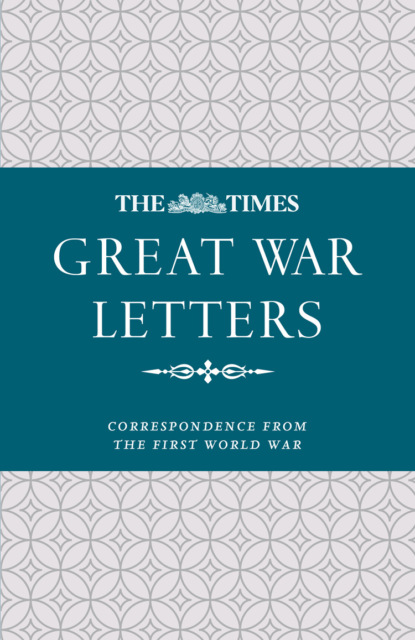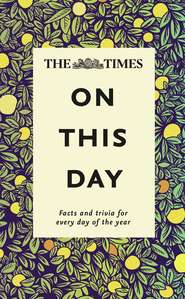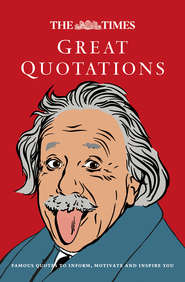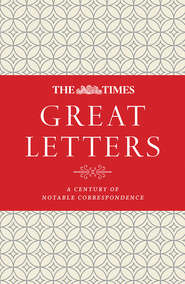По всем вопросам обращайтесь на: info@litportal.ru
(©) 2003-2024.
✖
The Times Great War Letters: Correspondence during the First World War
Автор
Год написания книги
2019
Настройки чтения
Размер шрифта
Высота строк
Поля
Other nations eventually became involved. Bulgaria and the Ottoman Empire sided with the Central Powers, while Japan and Italy came in with the Allies, the latter in 1915 after being promised historically Austrian territory on its then frontiers. The war spread through European colonies across much of the globe, although the United States remained neutral at first.
The British public hoped for a short conflict, but the secretary of state for war, Lord Kitchener, foresaw that it would last for years and that Britain’s small standing army would need massive expansion. Initial German successes in Belgium and France were stemmed in part by the British Expeditionary Force and the two sides settled into a slow, grim slog for territory, characterised as trench warfare.
For much of the war the British population had little detailed or accurate information about what was happening on the various fronts. The press played its part in concealing the truth, publishing rumours of German atrocities and spinning defeats as successes. Even so, the mounting toll of casualties could not be hidden, eventually approaching three-quarters of a million British dead (although this was far less than suffered by the French, Russian and German armies). The upper and middle classes, which supplied most of the junior officers who led attacks, were especially hard hit. Eton, for instance, lost 1,157 former pupils out of 5,619 who served.
After much debate, conscription was introduced in Britain for men between the ages of 18 and 41 in 1916; the age limit was raised to 50 two years later. Before then, recruitment had been supplied by volunteers – “Your Country Needs You”, as the famous poster had it. There had been political hesitation particularly over imposing armed service on working class men, who often did not have the vote since they were not property owners.
The continued strain of the war exposed many fracture lines. Suffragists kept up the pressure to give the vote to women, although some of the main campaigners focused their efforts on encouraging women to do war work to show their worth. Long-standing tensions within Ireland, then part of the United Kingdom, as to whether it should take its orders from London led in 1916 to the Easter Rising in Dublin (and eventually to an independent Republic). In Russia, catastrophe in battle ultimately led to the overthrow of the Tsar in 1917.
Many efforts were made to break the deadlock in the trenches. British efforts to outflank their enemies by forcing the Dardanelles and seizing Constantinople were thwarted by the Turks at Gallipoli, notwithstanding much gallantry and suffering by Australian and New Zealand troops, among many others. The failure led in time to the resignation from the cabinet of Winston Churchill, seen as the architect of the plan at the Admiralty.
By then, revelations in The Times about a shortage of artillery shells held responsible for recent setbacks on the Western Front led to Asquith being forced in mid-1915 to reconstitute his government as a coalition with the Conservatives and the first Labour cabinet minister. Lloyd George was placed in charge of a nationalised munitions policy and his successful implementation of it, together with the backing of The Times’s owner Lord Northcliffe, enabled him to unseat Asquith as prime minister at the end of 1916.
This was only shortly after the end of the prolonged Battle of the Somme, which came to symbolise the apparent futility of the conflict and its mass carnage. Civilians on the home front had also felt the effects of war as never before, with Zeppelins carrying out the first air raids over Britain and the depredations of submarines leading by 1918 to extensive rationing.
U-boat attacks on shipping bound for Britain, most notoriously the sinking of the liner Lusitania in 1915, with American passengers aboard, helped prompt President Woodrow Wilson to bring his nation to the Allied cause in 1917. The tide of the war did not turn decisively, however, until the summer of 1918, when breakthroughs on the Western Front and widespread discontent with the Kaiser in Germany led to his abdication and the signing of armistices in November.
The reverberations of the war would be felt for decades to come. The old order had been decisively shattered. Not only would the map of Europe, and indeed of the world, have to be redrawn as empires were dismembered and new nations created, but society’s assumptions had been shaken by the conflict, not least that as to which class was the only one fit to govern. And millions of those who had been affected by the war would have to live for the rest of their lives with the effects of wounds, shellshock, poison gas, grief and trauma. These letters were to prove to be the last snapshots of a vanishing age.
Notwithstanding that the letters in this anthology were written at a time when views that might give offence today were tolerated, the original language, style and format of them as they appeared in the newspaper has not been amended. The date on the letter is that on which it first appeared in the newspaper, and an index of the letter-writers can be found at the end of the book. Explanatory footnotes have been added where some clarification of the subject matter of a letter may be of use.
JAMES OWEN AND SAMANTHA WYNDHAM
1914 (#ulink_39aea8a1-ac8c-5ea9-a52f-cce665917470)
THE MENACE OF WAR
DOMINANCE OF RUSSIA OR GERMANY
1 August 1914
SIR,—A NATION’S FIRST duty is to its own people. We are asked to intervene in the Continental war because unless we do so we shall be “isolated.” The isolation which will result for us if we keep out of this war is that, while other nations are torn and weakened by war, we shall not be, and by that fact might conceivably for a long time be the strongest Power in Europe, and, by virtue of our strength and isolation, its arbiter, perhaps, to useful ends.
We are told that if we allow Germany to become victorious she would be so powerful as to threaten our existence by the occupation of Belgium, Holland, and possibly the North of France. But, as your article of to-day’s date so well points out, it was the difficulty which Germany found in Alsace-Lorraine which prevented her from acting against us during the South African War. If one province, so largely German in its origin and history, could create this embarrassment, what trouble will not Germany pile up for herself if she should attempt the absorption of a Belgium, a Holland, and a Normandy? She would have created for herself embarrassments compared with which Alsace and Poland would be a trifle; and Russia, with her 160,000,000, would in a year or two be as great a menace to her as ever.
The object and effect of our entering into this war would be to ensure the victory of Russia and her Slavonic allies. Will a dominant Slavonic federation of, say, 200,000,000 autocratically governed people, with a very rudimentary civilization, but heavily equipped for military aggression, be a less dangerous factor in Europe than a dominant Germany of 65,000,000 highly civilized and mainly given to the arts of trade and commerce?
The last war we fought on the Continent was for the purpose of preventing the growth of Russia. We are now asked to fight one for the purpose of promoting it. It is now universally admitted that our last Continental war—the Crimean War—was a monstrous error and miscalculation. Would this intervention be any wiser or likely to be better in its results?
On several occasions Sir Edward Grey has solemnly declared that we are not bound by any agreement to support France, and there is certainly no moral obligation on the part of the English people so to do. We can best serve civilization, Europe—including France—and ourselves by remaining the one Power in Europe that has not yielded to the war madness.
This, I believe, will be found to be the firm conviction of the overwhelming majority of the English people.
Yours faithfully,
NORMAN ANGELL
TRAVELLING FROM GERMANY
6 August 1914
SIR,—IN TO-DAY’S ISSUE of The Times you publish a letter by John Jay Chapman to which I and, I am sure, many others must take serious exception.
Your correspondent describes in lurid terms the sufferings experienced by travellers in Germany the last few days. “The hand of ruthless force which regarded neither God nor man was laid on them. Every decency of existing society had vanished. No appeal to any principle or power in the universe remained,” and so on ad nauseam.
I should like to chronicle my personal experience, which was of a vastly different character. Accompanied by another woman I travelled from Baden-Baden to Berlin on Friday last on a crowded train and we were, I believe, the only English people on board. The majority of the travellers were Germans and Russians. The stations en route were packed with people vainly desiring places, this state of things getting worse as we neared the capital. Everywhere we met with much more than the ordinary courtesy extended to women travelling. I was very much impressed by the real kindness and chivalry shown to us on three different occasions by German men, who voluntarily gave up their places to save us from sitting on our bags in a crowded corridor, and who put themselves to much trouble to obtain food for us at the stations.
We returned from Berlin last Saturday at 1 o’clock, and on arriving at Osnabruck at 5.30 heard that mobilization had begun. The train was held up several times to allow others to pass, all crowded with soldiers, and we knew that it might be our fate to be left stranded, should the authorities have required our train to convey troops in. Happily for us we reached England via Flushing without more inconvenience than would happen on any overcrowded train or boat.
I should like to put on record that during all those hours of intense excitement, with a nation newly called to arms, we did not meet with a single instance of rudeness in Germany. What is more, we never saw so much as a glance of enmity directed towards us. Even in Berlin itself last Saturday, where the whole town was in the throes of a deep national emotion, walking and driving among the huge crowd we never experienced anything but kindness.
Whatever our feelings may be as to the causes and nature of this war, it is devoutly to be hoped that English people will not be led astray by the irresponsible statements of travellers. We are at war with a great nation, and it behoves us to be true to ourselves and our English traditions of fair play.
FLORENCE PHILLIPS
OUR LATENT FORCES
8 August 1914
SIR,—THE FUTURE IS dark and we do not know that we will not need our last ounce of strength before we are through. We can afford to neglect nothing.
Will you allow me to point out how a reserve force can be formed which will be numerically large and which if it does nothing else can relieve more mobile and trained troops for the fighting line? In a word, the suggestion is to form civilian companies of the National Reserve. There are tens and hundreds of thousands of men in this country from 35 to 55 who are often harder and fitter than their juniors, but for whom no place is found in our scheme of defence. Many of them are good shots, they are longing to help in any possible way, and they would fall into line instantly if they could only see how to do it. They would speedily become capable of guarding railways or buildings, helping to garrison fortresses or performing many other military duties.
If I may quote the example of this little town, we held our first meeting to discuss this on Tuesday, by Wednesday night we had enrolled 120 men, and to-day we start drill and practice at the butts. Many of the men are fine shots and all are exceedingly anxious to be serviceable. It is not possible for them to take on long engagements or to live out in permanent camps, but they could do much useful work and in case of a raid they would do anything. They would from our “Land-sturm.” But at present there is no organization into which such men can be fitted. Local effort would rapidly form the various companies, but some method of common action has to be devised.
The obvious danger of such organization is lest it should divert men from the Territorials or any other more useful branch of the Service. But to recognize the danger is to avoid it. The Reserve company would not go the length of refusing to enlist young men who cannot or will not become Territorials, but it has the constant end before it of encouraging them to go further and of preparing them so that if they do join the more active Services they are already partly instructed. I am convinced that if they are properly run these civilian National Reserve companies would be not only of value in themselves but would be a stepping-stone for the younger men to take them into the fighting line.
The official organizations have so much upon them for the moment that the work can only be done by independent local effort. But when the men are there, as in the case of the existing National Reserve, they will command attention and find some means of arming themselves. We have our own record of organization, and I should be happy to send copies of our method to anyone who may desire to form other centres.
Yours faithfully,
ARTHUR CONAN DOYLE
THE USE OF THE UNTRAINED
8 August 1914
SIR,—THERE IS NOW no thought in the mind of any reasonable Englishman but to bring this war to a speedy and successful conclusion. Every man with any military training will be already in touch with his proper centre for utilization, and with that sort of man I, who am altogether untrained, have no concern. But I wish to point out that there is in the country a great mass of useful untrained material available and that it may be very readily called upon at the present time by the establishment of local committees. I suggest the formation at once of corps of local volunteers for use in local services, keeping order, transport, guerilla work in case of a raid, and so forth. I have in mind particularly the boy of 15, the man of 47, the mass of the untrained, the Boy Scouts and ex-Boy Scouts who have not gone on to any military training. There is no reason why all the surplus material should not be enrolled now. With it would be a considerable quantity of bicycles, small cars, and other material. This last line need not be drilled; it should not be expected to use either bayonet or spade; but upon the east and south coast at any rate it should have bandoliers, rifles, and Brownings (for close fighting) available, and by way of uniform it should have a badge. Perhaps it would not be a very effective fighting force, but it would permit of the release of a considerable number of men now keeping order, controlling transport, or doing the like work. Nobody wants to be a non-combatant in a war of this sort.
Very sincerely yours,
H. G. WELLS
CUTTING DOWN ON TEA-CAKES
11 August 1914
SIR,—WE HOUSEWIVES of England might assist the country somewhat during the coming time of stress by cutting off or cutting down the supply of cakes which are consumed at the tea-table both in the drawing-room and servants’ hall. In that way we could economize flour for the bread which is a necessity.








